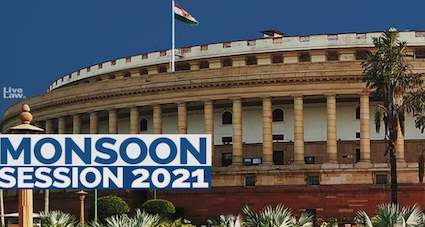The Monsoon Session of Parliament which prematurely concluded two days ago was a disgrace but when have our politicians and grace been on good terms?
Opposition tried their darnest best to not let the Parliament function, a place where legislation is debated and passed for the benefit of 1.39 billion people a few hundreds of these politicians represent.
From tearing up papers, to standing on benches, abusing, and finally ending with assaulting even a women-marshal, these politicians didn’t care a hoot about the life-and-death matter of Covid-19 that has ravaged the country or even the 3 farm bills which has sullied the country’s name and dishonoured the national flag. They even didn’t try to get introduced to a new cabinet in the Centre.
Yet, the Modi government was unstoppable even in this washout which had productivity as low as 21 per cent and 28 per cent for Lok Sabha and Rajya Sabha respectively. In all, 15 laws were introduced and 20 were passed by the Parliament.
Importantly, one of these laws (amendment) involved overruling Supreme Court, no less. The apex court had judged that States couldn’t decide on their own the Other Backward Castes list in deciding jobs or educational purposes. This new amendment in the Monsoon Session, restores this right to States.
A few important legislations passed in this session include:
Financial Reforms:
1. Taxation Laws (Amendment) Bill – this law nullified the retrospective taxation imposed on indirect transfer of Indian assets made before 28 May 2012. This provision was inserted in 2012, and had led to several arbitration cases against India.
2. General Insurance Business (Nationalisation) Amendment Bill): this bill removes the requirement of compulsory minimum shareholding of 51 per cent by the government of India on the four general insurance companies.
3. Factoring Regulation (Amendment) Bill – this bill allows all non-banking financial companies (NBFCs) to participate in the factoring business, thereby enabling micro small and medium enterprises (MSMEs) to have better cash flows.
4. Deposit Insurance and Credit Guarantee Corporation (Amendment) Bill: Under the new amendment, the DICGC will be liable to pay interim insured amount within 90 days of suspension of services of a bank.
5. Insolvency and Bankruptcy Code (Amendment) Bill: Introduces pre-package insolvency process for MSMEs for quicker resolution.
6. Limited Liability Partnerships (Amendment) Bill – this bill decriminalises various offences, makes other offences compoundable and converts some criminal offences into civil offences. It also introduced the concepts of small LLPs and startup LLPs, thereby marking a step towards ease of doing business.
Laws for Streamlining:
1. Marine Aids to Navigation Bill – it replaces the 1927 Lighthouse Act. It mainly creates a new legislative framework for aids to navigation and includes management of vessel traffic services for improving safety and efficiency of shipping.
2. Inland Vessels Bill – it replaces the 1917 Act. The bill brings a uniform regulatory regime for inland waterways and removes inter-state irregularities. This law can enable the development of freight transport through the waterways of India.
3. Airports Economic Regulatory Authority of India (Amendment) Bill – this bill allows clubbing of smaller airports together and notifying the group as a major airport. This move will help smaller airports expand and improve connectivity.
Laws for Security of State:
- Essential Defence Services Bill – this bill allows the government to issue orders prohibiting strikes, lockouts and layoffs in essential defence services such as ordnance factories.
Laws for Environment and Social Justice
1. Juvenile Justice (Care and Protection of Children) Amendment Bill – this bill increases the responsibilities of the DM with regards to various aspects of childcare and adoption and seeks to reduce the backlog of cases in courts for adoption.
2. Commission for Air Quality Management in National Capital Region and Adjoining Areas Bill – it dissolves the Environment Pollution Prevention and Control Authority (EPCA) and replaces it with the Commission for Air Quality Management (CAQM) which has wider powers. The former authority was not a statutory committee as compared to the CAQM which is a permanent statutory authority.
3. The Constitution (Scheduled Tribes) Order (Amendment) Bill, 2021 – it recognises the STs of Arunachal Pradesh as requested by the state government.
4. The Constitution (One Hundred and Twenty-Seventh Amendment) Bill, 2021 – it reverses the Supreme Court judgement of May by restoring the power of states to notify their own list of Other Backward Classes (OBCs) for purpose of reservation in educational institutes or employment.
Other bills which were also passed in the monsoon session are the Rationalisation of Tribunals (Amendment) Bill, The National Institutes of Food Technology, Entrepreneurship and Management Bill, The Coconut Development Board (Amendment) Bill, The Central Universities (Amendment) Bill, The National Commission for Homoeopathy (Amendment) Bill and The National Commission for Indian System of Medicine (Amendment) Bill.
Bills which weren’t passed in the session include the Assisted Reproductive Technology Bill and Electricity (Amendment) Bill.
(This piece is largely borrowed from Swarajyamag).


